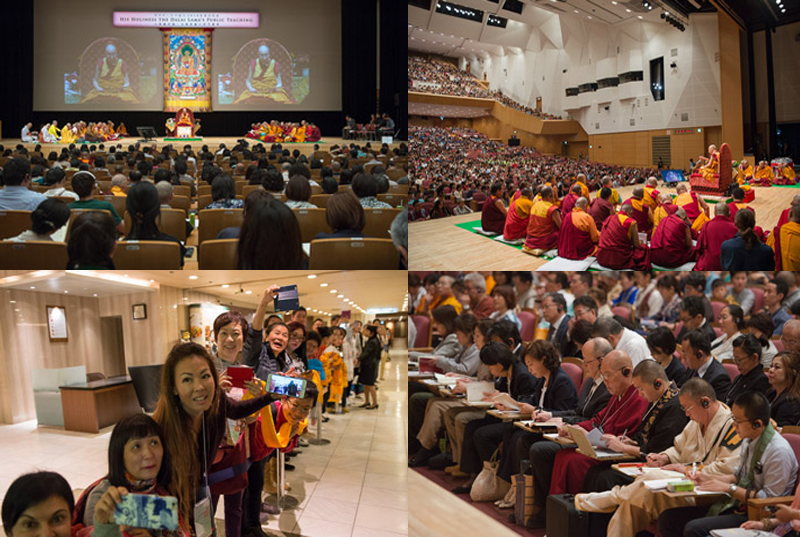 Osaka, Japan — Speaking about proposals to introduce secular ethics into modern education, His Holiness the Dalai Lama said 'religion no longer commands the universal appeal it once had, there is a need instead for a secular approach to human values.'
Osaka, Japan — Speaking about proposals to introduce secular ethics into modern education, His Holiness the Dalai Lama said 'religion no longer commands the universal appeal it once had, there is a need instead for a secular approach to human values.'
As His Holiness began the first of the four-day teachings on 'Guide to the Bodhisattva's Way of Life' at the Osaka International Conference Center Tuesday morning, over 2700 well-wishers, mostly devotees from Taiwan, lined up to greet him.
"First of all, I'm just one of 7 billion human beings alive today. As human beings we are all fundamentally the same. We share a common experience in that we are all born from a mother," he said, adding: "We survive because of her care and affection. Scientists working with young infants are coming up with findings that suggest that basic human nature is compassionate."
Common sense tells us that even if a family is poor, if they live in an atmosphere of affection they tend to be happy. A wealthy family, well provided for, but afflicted by suspicion and jealousy, tends to be unhappy. Clearly where there is love and compassion, happiness follows.
"We are social animals. We need friends and friendship depends on trust. Showing concern and affection for others is how we establish trust. Because we are interdependent, love and compassion are important in our lives. Recently I was encouraged to hear on the BBC that increasing numbers of young people regard themselves as global citizens.
"Similarly, the creation of the European Union is an instance of nations that once fought each other putting the past behind them and giving priority to their common interests.
We could all do well to adopt such a mature approach and regard ourselves as global citizens. Instead we tend to think in terms of 'us' and 'them', despite, as I mentioned above, the fact that as human beings we are all the same; members of one family."
Describing education today as focused on materialistic goals, but with little to say about how to find peace of mind, His Holiness noted that that used to be the province of religion.
"Today, however, when religion no longer commands the universal appeal it once had, there is a need instead for a secular approach to human values. He mentioned proposals to introduce secular ethics into modern education.
Looking back to the origins of Tibetan Buddhism, His Holiness recalled the efforts of the Bodhisattva abbot Shantarakshita working with the adept Guru Padmasambhava and King Songtsen Gampo.
Later, after Tibet had fragmented politically, the King of Ngari invited Atisha. He wrote his 'Lamp for the Path' and established the Kadampa tradition. 'Guide to the Bodhisattva's Way of Life' is one of the six classic texts of the Kadampas."
"Today, the crucial thing is to study," His Holiness advised. "In exile, monasteries that only performed rituals in the past have instituted programmes of study. Nuns too have been studying and the first group will shortly graduate and will be awarded Geshe-ma degrees."
"We all need to be 21st century Buddhists, which means we at least understand the nature of the Buddha, Dharma and Sangha, the teacher, his teaching, the path to cessation, and the community of those who put it into practice," he added.
Modern scientists are interested to compare these modes of thought with their own findings. Where the Chittamatra or Mind Only school asserts the unfindability of external phenomena, Quantum Physics suggests that external phenomena depend on the perceiving mind.
His Holiness cited what he considers the Buddha's scientific approach, quoting him as advising his followers not to accept what he said at face value, out of devotion, but to test it through investigation and experiment and only accept it if it makes sense.
Turning to the text he was to teach, His Holiness stated that its main thrust was generating the awakening mind and an understanding of emptiness.
The first chapter begins by outlining the benefits of the awakening mind, while the ninth presents an explanation of emptiness to which the preceding chapters are preliminary. It is observed that while compassion focuses on sentient beings; wisdom focuses on enlightenment.


![Tibet has a rich history as a sovereign nation until the 1950s when it was invaded by China. [Photo: File]](/images/stories/Pics-2024/March/Tibet-Nation-1940s.jpg#joomlaImage://local-images/stories/Pics-2024/March/Tibet-Nation-1940s.jpg?width=1489&height=878)















